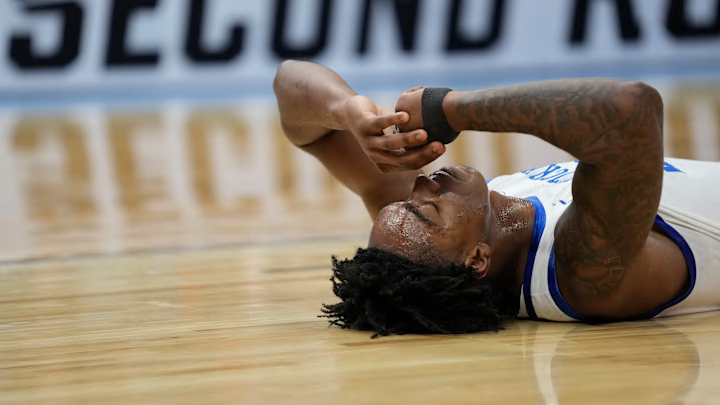When Amari Williams joined Kentucky basketball, he knew he was stepping into a program where standards weren’t negotiable. Mark Pope made that very clear. Still, nothing could have prepared him for one of the most brutal punishments he’s ever experienced, a drill that left him and his teammates gasping for air, legs trembling, and jerseys soaked.
All because a teammate wasn’t five minutes early to practice.
The drill: What is a “17”?
For those unfamiliar, a “17” is a conditioning gauntlet. Players sprint sideline to sideline across the width of the court 17 times in a row, full effort, no jogging, no shortcuts. It’s a test of speed, endurance, and mental toughness.
Now, imagine not doing one of those. Not five. Not ten. But seventeen 17s in a row. That’s 289 sprints, nearly 11 miles of full-speed running inside a gym, with the entire roster punished for one player’s failure to meet the program’s definition of “on time.”
“It was crazy,” Williams recalled. “We thought we were doing one 17... 17" It turned into a full on sprint fest after a hard practice.
Why so harsh? The culture behind the punishment
At first glance, it might seem excessive. But this wasn’t about running laps, it was about enforcing a standard. Kentucky head coach Mark Pope has made it clear that details matter. If “five minutes early” is the rule, then four minutes early is late.
And when one guy slips, the whole team pays. That’s how accountability gets baked into a roster and into a program.
Other elite coaches have built legacies the same way:
- Mike Krzyzewski (Duke) famously punished teams for being one minute late to meetings, often by cancelling practice and doubling the workload the next day.
- Tom Izzo (Michigan State) has run entire practices where players never touched a ball because of missed curfews.
The logic is simple: if you cut corners on the little things, you’ll cut corners when it matters most, in March.
The numbers: 289 sprints in perspective
To understand the severity, let’s break it down math style:
- A college basketball court is 94 feet wide.
- A sideline-to-sideline sprint is 47 feet (one way).
- One “17” = 17 down-and-backs → 1,598 feet, or about 0.3 miles.
- Seventeen 17s = 5.1 miles of all-out sprinting (not counting breaks or resets).
Factor in the intensity, and physiologists say it could equal 10–11 miles of fatigue load. In one practice.
That’s not just conditioning. That’s survival training.
Mark Pope doesn’t play around. 👀
— Chris Beasmore (@CBeasmoreSports) October 1, 2025
Amari Williams shared a wild story about Pope’s no-nonsense approach at Kentucky. One player showed up “on time," but not the expected 5 minutes early. The next day, the entire team had to run 17 sets of 17s 😳 (sideline-to-sideline sprints).… pic.twitter.com/IVfIP9Kl0n
Why It matters for Kentucky basketball
This punishment wasn’t random cruelty because one player was late; it was a message. Mark Pope is trying to reset Kentucky’s identity. After years of inconsistency under Calipari, Pope has emphasized:
- Discipline in preparation → “Five minutes early” means locked in.
- Accountability as a unit → One man’s mistake is everyone’s burden.
- Toughness through suffering → Players won’t just be fast; they’ll be hardened.
It’s no accident that Pope’s teams at BYU often overachieved in close games. Conditioning and discipline translate directly to late-game execution. And now, that same standard is being forged in Lexington. It is about creating a culture that cares and is responsible.
The psychology of shared punishment
Sports psychologists often talk about “collective suffering” as a culture builder. When an entire roster pays for one mistake, resentment doesn’t grow, unity does. Teammates learn to hold each other accountable before the coach ever has to.
That’s how standards stick.
Looking ahead
Fans may see “289 sprints” and think it’s insane. And maybe it is. But it’s also a glimpse into how Pope is building Kentucky’s future. He doesn’t just want talent; he wants a culture where details matter and excuses don’t. Don't tell me why you didn't, just do it.
The Wildcats’ biggest question isn’t whether Pope can recruit, he’s already landing elite players. It’s whether his methods can harden them into a team capable of grinding through March.
And if Amari Williams’ story is any indication, Kentucky is on the right path to being able to do so.
Question for BBN: Will this level of discipline pay off in March, or is Pope pushing too hard too early?
Drew Holbrook is an avid Kentucky fan who has been covering the Cats for over 10 years. In his free time he enjoys downtime with his family and Premier League soccer. You can find him on X here. Micah 7:7. #UptheAlbion
